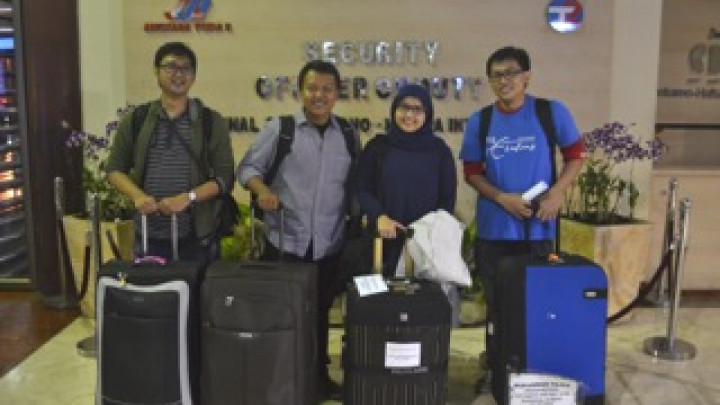Dr. Kadek Wara Urwasi's Dissertation Successf...
17 April 2024

 The four 2014 Arryman Fellows – Muhammad Fajar, Luthfi Adam, Najmu Laila Sopian and Rahardhika Arista Utama – left Jakarta for Chicago on July 2, 2013. These fellows were selected in April 2013, and will spend one year in Chicago as non-degree graduate students at Northwestern University. Before departing for Northwestern University, the four fellows took one-month intensive English course at University of Indonesia’s International Language Institute. The course aims to provide the fellows the new TOEFL Internet-based Test (iBT) preparation training at upper-intermediate level of English proficiency.
The four 2014 Arryman Fellows – Muhammad Fajar, Luthfi Adam, Najmu Laila Sopian and Rahardhika Arista Utama – left Jakarta for Chicago on July 2, 2013. These fellows were selected in April 2013, and will spend one year in Chicago as non-degree graduate students at Northwestern University. Before departing for Northwestern University, the four fellows took one-month intensive English course at University of Indonesia’s International Language Institute. The course aims to provide the fellows the new TOEFL Internet-based Test (iBT) preparation training at upper-intermediate level of English proficiency.
They arrived in Chicago for the first time on July 3, 2013. EDGS (Equality Development and Globalization Studies) at BCICS, Northwestern University, is the hosting institution during their one-year fellowship. They will apply for graduate school at Northwestern University in 2014. If they are admitted, the 2013 Arryman Fellows will become the 2014 Arryman Scholars to pursue their doctorate degree in the next six years.
Apart from developing the skills assessed in iBT TOEFL, the participants will also receive training in test taking strategies that will enable them to increase their scores significantly. Through integrated skill practice, participants are to develop their critical thinking and communicative competence as well. In this approach, participants develop their academic skills in English while building test-taking confidence.
 Course Objectives
By the end of the course, the participants are expected to have acquired a higher competence in the four language skills tested in iBT i.e. listening, reading, speaking and writing as follows:
1. Listening:
The participants should be able to understand campus conversations along with the practical vocabulary and situations encountered in everyday life in a college or university. The participants should also be able to understand lectures, reports and interviews with variety of styles and topics. Participants practice structured and semi-structured note-taking that not only enhance comprehension of both listening and reading selections but also enable them to organize information for speaking and writing responses.
Course Objectives
By the end of the course, the participants are expected to have acquired a higher competence in the four language skills tested in iBT i.e. listening, reading, speaking and writing as follows:
1. Listening:
The participants should be able to understand campus conversations along with the practical vocabulary and situations encountered in everyday life in a college or university. The participants should also be able to understand lectures, reports and interviews with variety of styles and topics. Participants practice structured and semi-structured note-taking that not only enhance comprehension of both listening and reading selections but also enable them to organize information for speaking and writing responses.